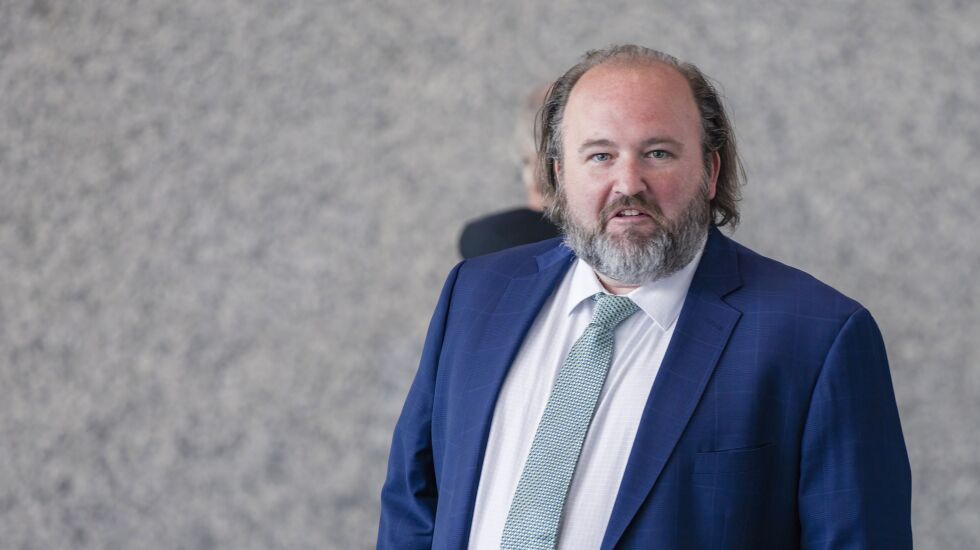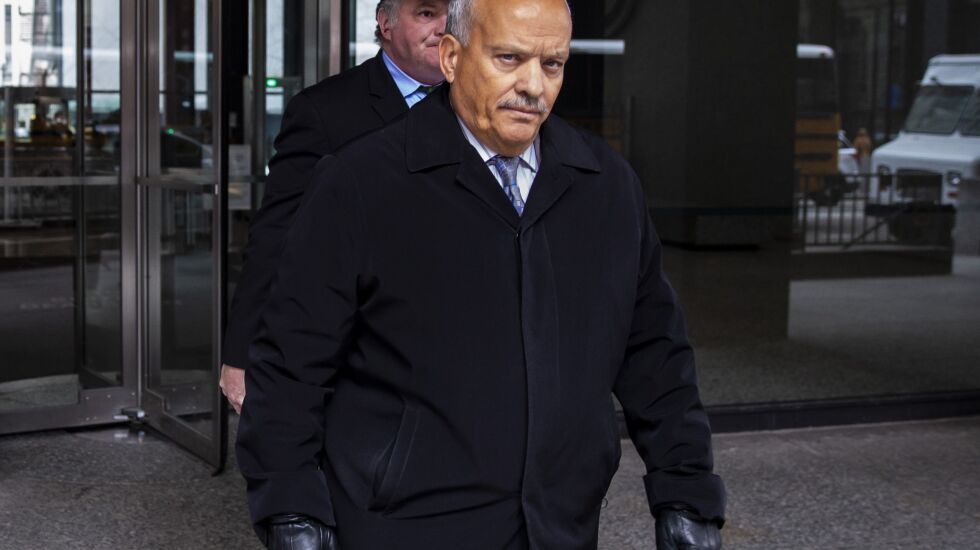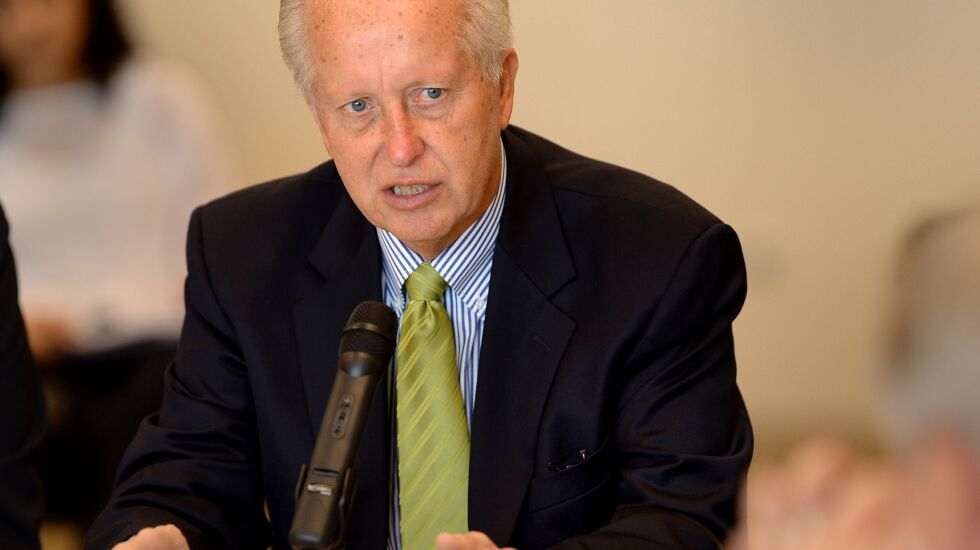
The FBI may have made a splash when it moved in on corrupt state Rep. Luis Arroyo late in October 2019, but its agents were also quietly circling a businessman suspected of paying bribes to the veteran lawmaker.
James T. Weiss, son-in-law of former Cook County Assessor Joseph Berrios, was driving in Maywood that month when agents pulled him over and questioned him for more than an hour near Veterans Memorial Park. He told them he was being honest and wasn’t “a rookie.”
But he also claimed he’d spoken by phone to a Winnetka consultant named “Katherine Hunter.” And unfortunately for Weiss, Hunter was in reality a “fictitious individual invented by law enforcement” as part of the feds’ investigation, records show.
Now Weiss faces trial Monday for his role in the same bribery scheme that put Arroyo behind bars for nearly five years — and for allegedly lying to the FBI that day in October 2019. Weiss, who wasn’t charged until October 2020, will try to avoid the same fate as five others who have gone to trial so far this year while facing charges from the feds’ aggressive pursuit of public corruption in Illinois.
A federal jury last month convicted four former political insiders who conspired to bribe then-Illinois House Speaker Michael J. Madigan to benefit ComEd. While that trial stretched across eight weeks, Weiss’ will likely last only a couple of days. Still, like the ComEd bribery trial, Weiss’ trial is expected to feature secret FBI recordings and revolve around the business of lobbying.
It could also feature testimony from current and former state lawmakers, including state Rep. Robert “Bob” Rita, who testified during the ComEd bribery trial, and former state Sen. Antonio “Tony” Munoz. Former Chicago Ald. Patrick O’Connor could also be called as a witness.
However, Weiss’ attorneys have asked the judge to block any mention of Madigan or his son, Andrew Madigan, who happens to be friends with Weiss. They also want to avoid any mention of Berrios or Weiss’ wife, former state Rep. Toni Berrios.
Weiss had sought to advance legislation in Springfield related to unregulated gambling devices known as “sweepstakes” machines, records show. He is charged with wire fraud, mail fraud, bribery and lying to FBI agents.
Ilia Usharovich, one of Weiss’ defense attorneys, declined to talk about the case when contacted by the Chicago Sun-Times.
The fifth person convicted by a jury earlier this year was Alex Acevedo, son of former state Rep. Edward “Eddie” Acevedo. His trial on tax crimes resulted from the same investigation that led to the ComEd bribery trial and last year’s racketeering indictment against Madigan, who is set for trial in April.
Meanwhile, two other former state lawmakers involved in Weiss’ case have already been convicted. Arroyo is serving a 57-month prison sentence in Pensacola, Florida, after admitting he’d taken bribes from Weiss. He is not due to be released until June 2026, records show.
Prosecutors confirmed during a hearing Friday that Arroyo would not testify during Weiss’ trial, and a defense attorney signaled it could become a critical issue in the case.
Then there’s former state Sen. Terry Link, who is set to play the role of star witness in Weiss’ trial. Link worked secretly with the feds hoping he’d land a sentencing break for his own tax crimes they’d uncovered. A source confirmed Link’s role in the case for the Chicago Sun-Times when Arroyo was first charged in October 2019.
Link publicly denied it. But then, in summer 2020, Link resigned from the Senate after federal prosecutors charged him with filing a false income tax return. Link pleaded guilty and, in doing so, formally agreed to “fully and truthfully cooperate in any matter in which he is called upon” by the feds.
Nearly three years later, Link is set to take the witness stand in a potentially dramatic moment. Another high-profile government cooperator, Fidel Marquez, testified two months ago during the ComEd bribery trial and faced a scathing cross-examination from a defense attorney.
Like Marquez, Link has not been sentenced.
Presiding over Weiss’ trial will be U.S. District Judge Steven Seeger, who joined the bench in 2019 following his nomination by President Donald Trump. He handed Arroyo his lengthy prison sentence in May 2022, and, in doing so, thoroughly denounced the former lawmaker.
During that sentencing hearing, Seeger called Arroyo “a dirty politician who was on the take” and a “corruption super spreader.”
And then, during a pretrial hearing last month for Weiss, Arroyo’s name came up again. Seeger told the lawyers, “I remember him.”

‘This is the jackpot’
The indictment handed up against Weiss and Arroyo alleges that Arroyo effectively served for a year as Weiss’ bought-and-paid-for member of the Illinois House of Representatives.
In exchange for bribes allegedly paid by Weiss to the tune of $32,500, Arroyo agreed to vote for and promote sweepstakes legislation, leaned on members of the executive branch and spoke out in favor of the legislation at hearings. Weiss allegedly made the bribe payments through his business, Collage LLC, to Arroyo’s, known as Spartacus 3 LLC.
When the legislation didn’t pass, Weiss and Arroyo turned to Link, who was secretly cooperating with the feds.
The three men, along with an intern of Arroyo’s, discussed the sweepstakes legislation at a restaurant in Highland Park on Aug. 2, 2019. But Link eventually asked to speak with Arroyo alone. The two men stepped outside, where they were video-recorded by law enforcement.
That’s when Link asked, “What’s in it for me?” Arroyo described himself as a “paid consultant” receiving $2,500 a month and said, “If you put a price on it, I mean, if you want to get paid, you want somebody else to get a check monthly, a monthly stipend, we could put them on contract.”
Arroyo and Link met again Aug. 22, 2019, at a restaurant in Skokie. That’s where Arroyo allegedly handed Link a $2,500 check signed by Weiss from his business, Collage.
Arroyo also allegedly gave Link Weiss’ business card, as well as the proposed sweepstakes legislation.
“This is the jackpot,” Arroyo told Link.

But Arroyo needed a name to put on the check, so he said “just put the name down here.” That’s when the feds say Link told him the check should be made out to “Katherine Hunter” — the fictional character concocted by law enforcement.
Link told Arroyo she was “just a friend,” records show.
Arroyo told Link “we’re going to write you a check per month … six months to a year. What do you prefer?”
Link replied, “whatever. A year sounds great.”
That same day, Weiss emailed information about sweepstakes legislation to Link, according to the feds. Weiss also sent another email to Link four days later.
“I appreciate your help and assistance,” Weiss allegedly wrote. “I know there are several challenges in front of me with sweepstakes. Please let me know if there is anyone else you would recommend I meet with and share information. Respectfully, Jimmy Weiss.”
Two months later, on Oct. 22, 2019, Weiss allegedly mailed a $2,500 check from Collage made out to “Hunter” to a post office box for Link. He also allegedly mailed a signed services agreement for “Hunter” to perform consulting services for one year at $2,500 a month.
Three days later, Weiss was stopped by the FBI in Maywood and spoke to agents in the back of their car. That’s when he allegedly told them a series of lies, including that he’d spoken with “Hunter.”
Weiss also allegedly told agents he knew “Hunter” would be getting a check before he provided the check for Arroyo and Link’s meeting on Aug. 22, 2019. But that meeting was when Link first gave the name “Hunter” to Arroyo, records show.
The feds also say Weiss denied knowing he was sending a check to a post office box associated with Link. That’s despite the fact that Arroyo had texted Weiss a picture of a Post-It note with Link’s name and post office box on it. Weiss had allegedly also texted that picture to Link after Link asked him by text, “Did you send me the check?”
“This is where Lou [Arroyo] told me to send it,” Weiss allegedly wrote in that text to Link.
Defense: ‘Impossible’ to know about bribery
Nevertheless, Weiss’ lawyers have insisted there is “no evidence of any agreement” in which Weiss would make payments to Arroyo’s business and “Hunter” in exchange for help passing sweepstakes legislation. Rather, they argue the payments from Weiss’ business to Arroyo’s were for separate lobbying work by Arroyo at Chicago City Hall, also related to sweepstakes machines.
“The evidence shows Arroyo did do such work,” defense attorney Usharovich wrote in a recent court filing. “He lobbied the city, set up meetings, and otherwise consulted with [Weiss].”
Usharovich also wrote it’s “important to note that Weiss’ desire to gain access to politicians and others, by itself, does not amount to an intent to influence improperly the legislators’ exercise of official duties.
“There is no legislative duty to provide equal access to all members of the public,” Usharovich wrote. “The circumstances required [Weiss] to develop contacts in the legislature and, as with all lobbyists and businessmen, his goal was to persuade and influence legislators to benefit certain interests.”
The defense attorney wrote it was “impossible” for Weiss to know about the deal struck between Arroyo and Link, as he was “deliberately isolated and excluded” from discussions about bribery.
As for “Katherine Hunter,” Usharovich noted the initial check written to that person was cashed, which would lead a reasonable person to believe she existed. And as for Weiss’ claim that he spoke to her, Usharovich called it “a statement of belief, not a fact.”
“[Weiss] stated Arroyo placed [Weiss] on the phone with a woman who [Weiss] believed was named Katherine and was going to be the lobbyist they hire,” Usharovich wrote. “There is no proof to show that [Weiss’] belief was unreasonable or false.”







